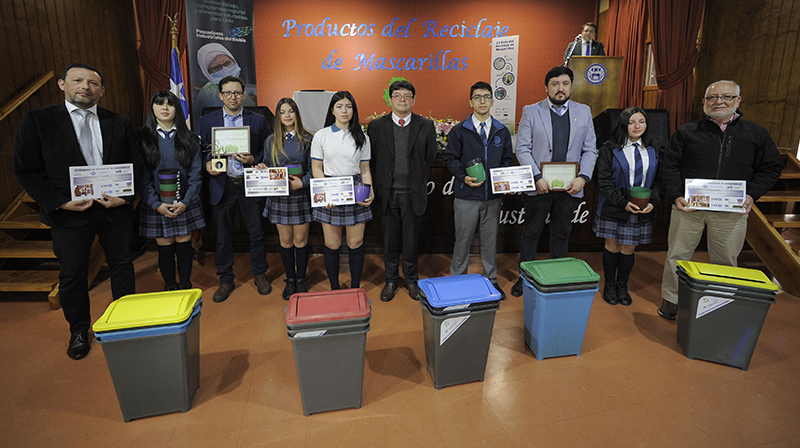In the Liceo Bicentenario Industrial of Tomé, the delivery of trash cans and planters made with pellets of these personal protection elements was made, one of the most notable initiatives of circular economy promoted from the Biobío Region.
In order to continue promoting the environmental education of the 3 thousand students of the five high schools belonging to the Corporación de Estudio de la CPC Biobío, this Wednesday, trash cans and planters made from the recycling of 250 kilos of disposable masks, equivalent to some 62,500 units collected from these establishments, were delivered. This initiative is the result of an agreement signed in July 2021 between the Industrial Fishermen of Biobío, the Technological Development Unit of the Universidad de Concepción and the Corporation, which sought to add new allies to the struggle to give a sustainable destination to these elements of personal protection.
At the Liceo Bicentenario Industrial de Tomé, products made from the recycling of disposable masks were handed out, one of the most notable circular economy initiatives promoted by the Biobío Region, which began as a pilot project in July 2020, coordinating the efforts of the Ministries of the Environment and Science, the Industrial Fishermen and the UDT.
Alliance
“It is a great pride to see today the result of a new partnership with the productive sector that we started in the middle of last year, this time after a new major objective which is to strengthen in the training process the concept of circular economy. Today, our students visualize a new contribution to the care of the environment, since, with only their willingness to deposit a waste in a container, thanks to technology, they were transformed into a new useful good. We will stop using masks, but the lessons learned from this great initiative will be maintained over time,” said Andreina Borzone, general manager of the Corporación de Estudio de la CPC Biobío.
Since this alliance was established in July last year, the Industrial Fishermen of Biobío, specifically the companies Blumar, PacificBlu, Landes, Camanchaca Pesca Sur and Salmones Camanchaca, have been responsible for the monthly collection of these masks from the educational establishments, which were transported to the UDT for storage, disinfection and processing.
In this sense, Monserrat Jamett, head of Sustainability of the union, valued that “in this period, teachers, students and para-teachers managed to recover 62,500 masks that were transformed into the flowerpots and trash cans that we are delivering today. Recycling 250 kilos of masks is a source of pride for these educational communities and represents an important contribution to the control of one of the environmental effects of the pandemic”. The intensive use of these protective elements generated significant environmental damage, due to their composition of non-biodegradable polymers. He added that, with the utensils delivered to the educational communities, “we symbolize the positive alliance with the Corporación de Estudio de la CPC Biobío, which allowed us to give a sustainable destination to thousands of masks by recovering them and preventing them from ending up as simple garbage”.
Balance
For the principal of the Liceo Industrial de Tomé, Rodrigo Bisama, this initiative boosted and deepened a practice that has been gradually incorporated into the educational community. “Since we assumed the commitment with our Department of Environment, it has been an activity that has been increasing, that the students have been learning it and that today it is super marked, because we are in other recycling campaigns and the establishment is acquiring more and more protagonism within the commune”, the director pointed out.
Meanwhile, Marcelo Finsterbusch, commercial manager of the Department of Consultancy and Innovation of the UDT, thanked the effort made by the different school communities to collect the masks that they used for so long as an element of protection against the COVID infection, “part of which were transformed into products such as flower pots and garbage cans, with which it is evident that recovery and recycling is possible, educating the community, organizing the way to collect and executing actions as simple as depositing the masks in the appropriate containers”.
Source: Página V

